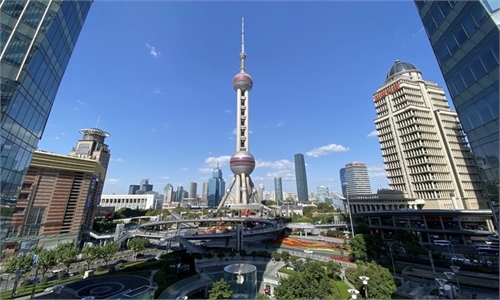
Birdview of Shanghai Photo: VCG
Foreign investment in China’s securities market showed a net increase in November, while the net inflow of foreign direct investment (FDI) accelerated from the previous month, an official from the State Administration of Foreign Exchange (SAFE) said on Thursday.
Experts attributed the continued rise in foreign investment to factors such as expectations for a rapid economic recovery and relatively low prices of China's equity assets.
The net inflow of FDI grew "relatively fast" in November compared with the previous month, Wang Chunying, deputy head and spokesperson for the SAFE, said during a press conference, adding that foreign investment in the domestic securities market showed a net increase in the month.
Also, a total of $34.3 billion in cross-border capital flowed into China under the category of trade in goods in November, up 4 percent on a monthly basis, which is a sign of an improving export situation.
"China's foreign exchange market operated more smoothly in November, and domestic foreign exchange supply and demand remained basically balanced," Wang said, revealing that banks' deficit of foreign exchange settlement and sales narrowed by 47 percent in November compared with the previous month.
As of the end of November, China's foreign exchange reserves stood at $3.12 trillion, up 2.13 percent compared with the end of October, the SAFE data showed.
Wang said it is expected that cross-border funds such as FDI will continue to flow in steadily and will play a fundamental role in stabilizing the foreign exchange market.
Xi Junyang, a professor at the Shanghai University of Finance and Economics, said that the optimizing of China's COVID-19 prevention measures raises market expectations for an economic rebound, and investors are viewing the present moment as a "turning point" of the Chinese economy, thus hastening their investment into the country.
Due to the effects of US interest rate hikes and worries about a possible global economic recession next year, bearish forces are accumulating on US stock markets, making Chinese assets more attractive to overseas investors.
Wang also said that as China better coordinates epidemic prevention and economic/social development, and a package of policies and follow-up measures to stabilize the economy are fully implemented and effective, the economy is expected to maintain a stable upward trend, which will further boost market expectations and confidence.
China's stable international balance of payments structure and enhanced internal resilience of the foreign exchange market will help China's foreign exchange market to maintain stable operation, Wang noted.


